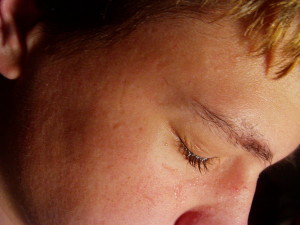Article Contributed By: David Greenspan, content writer at Lighthouse Recovery Institute
 Sexual addiction is a serious medical condition. Often, it’s written off as a failure of willpower or some sort of moral issue. This simply isn’t the case. The good news (remember, there’s always good news!) is that like any addiction, you can recover from sexual addiction, but you need to address the sexual addiction triggers.
Sexual addiction is a serious medical condition. Often, it’s written off as a failure of willpower or some sort of moral issue. This simply isn’t the case. The good news (remember, there’s always good news!) is that like any addiction, you can recover from sexual addiction, but you need to address the sexual addiction triggers.
Below, find a breakdown of what exactly sexual addiction is. Learn common for sexual addiction triggers. Finally, learn the tools to successfully recover from any type of addiction.
Sexual Addiction: The Basics
Sex addiction is defined as a chronic and progressive affection disorder [i]. Chronic means that symptoms don’t occur only once. It means that those suffering from a sex addiction continue to act out of their disorder. Progressive means that, over any given period of time, their symptoms get worse.
The symptoms of sexual addiction vary and range in their severity from mild to serious.
Mild symptoms consist of things like:
- Excessive pornography viewing
- Chronic masturbation
Severe symptoms consist of things like:
- Exhibitionism
- Voyeurism
- In extreme cases, rape
Persistent and Escalating Patterns
The progressive nature of addiction consists of an individual’s symptoms growing more severe over time.
In fact, the National Council on Sexual Addiction and Compulsivity defines sexual addiction as “engaging in persistent and escalating patterns of sexual behavior acted out despite increasing negative consequences to self and others” [ii] (emphasis added by the author).
Addict Does Not Mean Predator
So, over a period of time, a sex addict could move from chronic masturbation to voyeurism. However, this isn’t always the case. It’s important to remember that sex addicts aren’t all sexual predators.
Case in point, it’s believed that 55% of convicted sex offenders are also sex addicts [iii]. 55% is a large number, but it isn’t 100%.
Sexual Addiction Triggers

Like any addiction, there are certain stimuli which trigger an emotional or mental response for sex addicts. Triggers can, broadly speaking, be broken down into two categories – internal and external triggers.
Find detailed, though certainly not all-inclusive, lists of common internal and external triggers below.
Internal Triggers
Internal triggers are thoughts, emotions, and feelings. These include things like:
- Loneliness
- Boredom
- Memories
- A certain fantasy
- Past trauma
These internal triggers can lead a sex addict to act out and relapse on their addiction.
External Triggers
External triggers consist of all the stimuli that surround us. This includes:
- Pictures
- Smells
- Movies
- Bars
- Other people
- The Internet
These all have the potential to trigger someone with a sex addiction.
It’s important to note that the above external triggers aren’t triggers for every sex addict. Rather, they possess the potential to be triggering. It’s vital for sex addicts in recovery to identify and avoid their particular triggers.
So, one person may be able to watch a Victoria’s Secret commercial without danger, while the same commercial would send someone else into active addiction.
Tools Against Sexual Addiction Triggers
We’ve identified what sex addiction is and common types of external and internal triggers. Now comes the important part, what can John or Jane Doe use as tools against their sexual addiction triggers?
Avoidance
There are many different types of tools. Perhaps the most basic is to avoid triggering situations. For example, if bars are one of your external triggers, don’t go to bars! If hunger is one of your internal triggers, make sure to eat regularly!
However, recovery from any addiction, including sex addiction, isn’t always as easy as avoiding triggers.
Counseling
This brings us to the next tool, counseling. Counseling can consist of individual or group therapies. It can be once a day, once a week, once a month, or anywhere in between. It can be as intensive or non-intensive as those participating want.
Treatment Centers

For those who need help a step above counseling, there are many sexual addiction treatment centers. These are similar to drug and alcohol treatment centers but focus instead on sexual health and wellness.
They’re often gender specific. Sex addiction treatment centers vary in their level of intensiveness, ranging from outpatient, to intensive outpatient, to partial hospitalization, to inpatient, to long-term inpatient.
Medications
Certain antidepressant medications are thought to be effective in mitigating sex addiction triggers [iv]. While the mechanism behind antidepressants helping treat sex addiction isn’t entirely known, it’s believed that they “rewire” the brain. SSRI type antidepressants are also known to decrease libido in many of their users.
Fellowships
Finally, there are twelve-step fellowships devoted solely to freedom from sexual addiction. These include Sex & Love Anonymous, Sex Addicts Anonymous, Sexual Compulsives Anonymous, and Sexaholics Anonymous.
Recovery and Hope
It’s clear there are a lot of recovery options for anyone struggling with a sexual addiction. There’s avoiding triggering stimuli, all sorts of counseling, medication, and even twelve-step groups.
This plethora of options means that recovery isn’t only possible, it’s within everyone’s grasp.
References:
[i] to [iii]: http://psychcentral.com/lib/what-is-sexual-addiction/000748
[iv]: http://www.medicalnewstoday.com/articles/182473.php
About the Author:
David Greenspan is a content writer at Lighthouse Recovery Institute. He received a B.A. in Communications and Sociology from Florida Atlantic University.
David’s a lifelong fiction and poetry writer and has been published in numerous literary journals, including: Anti-, Berfrois, Gigantic, Mid-American Review, Painted Bride Quarterly, and West Branch.
The opinions and views of our guest contributors are shared to provide a broad perspective of addictions. These are not necessarily the views of Addiction Hope, but an effort to offer a discussion of various issues by different concerned individuals.
We at Addiction Hope understand that addictions result from a combination of environmental and genetic factors. If you or a loved one are suffering from an addiction, please know that there is hope for you, and seek immediate professional help.
Published on October 6, 2014
Last Updated & Reviewed By: Jacquelyn Ekern, MS, LPC on June 4, 2018
Published on AddictionHope.com
